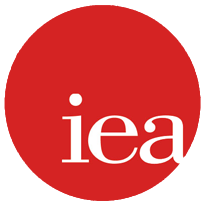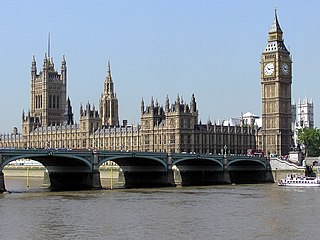
Peter Bruce Lilley, Baron Lilley, PC is a British politician and life peer who served as a cabinet minister in the governments of Margaret Thatcher and John Major. A member of the Conservative Party, he was Member of Parliament (MP) Hitchin and Harpenden from 1997 to 2017 and, prior to boundary changes, St Albans from 1983.

The Institute of Economic Affairs (IEA) is a right-wing, free market think tank registered as a UK charity. Associated with the New Right, the IEA describes itself as an "educational research institute" and says that it seeks to "further the dissemination of free-market thinking" by "analysing and expounding the role of markets in solving economic and social problems". The IEA is the oldest free market think-tank in the UK and was established to promote free-market responses to economic challenges by targeting influential academics and journalists, as well as students, in order to propagate these ideas widely. Adopting as its credo FA Hayek's view that "yesterday's dissent becomes today's consensus," the IEA says that it prioritises producing work with a focus on economic insights over partisan politics.
The Bruges Group is a think tank based in the United Kingdom. Founded in 1989, it advocates for a restructuring of Britain's relationship with the European Union and other European countries. Its members and staff campaign against the notion of an "ever-closer union" in Europe and, above all, against British involvement in a single European state. The group is often associated with the Conservative Party, including MPs such as Iain Duncan Smith, Daniel Hannan, John Redwood, and Norman Lamont. However, it is formally an independent all-party think tank, and some Labour MPs and peers have cited the publications or attended the meetings of the Bruges Group through the years, such as Frank Field, Gisela Stuart, Lord Stoddart of Swindon and Lord Shore of Stepney.

Labour Students is a student organisation within the Labour Party of the United Kingdom. It is a network of affiliated college and university clubs, known as Labour Clubs, who campaign in their campuses and communities for Labour's values of equality and social justice.

The Bow Group is a UK-based think tank promoting conservative opinion. Founded in 1951, it is the oldest group of its kind, counting many senior Conservative Party MPs and peers among its members. It represents a forum for political debate with its varied programme of events and official journal.

Nicholas Edward Coleridge Boles is a British politician who was the Member of Parliament (MP) for Grantham and Stamford from 2010 to 2019. He was a member of the Conservative Party until 2019.

The Henry Jackson Society (HJS) is a trans-Atlantic foreign policy and national security think tank, based in the United Kingdom. While describing itself as non-partisan, its outlook has been described variously as "right-wing", neoliberal and as neoconservative. The Society identifies itself with a "forward strategy" to spread democracy and liberal values globally. It is currently focused primarily on supporting global democracy in the face of threats from China and Russia. The Society is also known for its reports related to Islamic and far-right extremism. The Society is named after the US Senator and leading Democrat, Henry M. Jackson. American political journalist, Michael Allen, described the society as "a non-partisan group that convenes transatlantic center-left, center-right and independent figures committed to Jackson's legacy of 'democratic geopolitics.'"

Cambridge University Liberal Association (CULA) is the student branch of the Liberal Democrats for students at Cambridge University.
The Cambridge University Conservative Association, or CUCA, is a student political society founded 1921, as a Conservative Association for students at Cambridge University, although it has earlier roots in the late nineteenth century. CUCA is not affiliated with the nationwide youth branch of the Conservative Party, the Young Conservatives, but is a fully independent Association distinct from other Conservative youth organisations. The association puts on a range of events for its members each term, notably its ‘Port & Policy’ debates, as well as addresses from a number of high-profile speakers.
Policy Exchange is a British conservative think tank based in London. In 2007 it was described in The Daily Telegraph as "the largest, but also the most influential think tank on the right". The Washington Post said Policy Exchange's reports "often inform government policy in Britain." and Iain Dale described it on ConservativeHome as the "pre-eminent think tank in the Westminster village". Policy Exchange is a registered charity. It refuses to disclose the sources of its funding.

The Parliamentary Office of Science and Technology (POST) is the Parliament of the United Kingdom's in-house source of independent, balanced and accessible analysis of public policy issues related to science and technology. POST serves both Houses of Parliament.

Open Europe was a British centre-right eurosceptic policy think tank with offices in London and Brussels, merging with the Policy Exchange think tank in 2020.
The Legatum Institute is a think tank based in London, UK. Its stated aim is to advance the education of the public in national and international political, social and economic policy. The Institute has over forty donors including the Legatum Foundation. It has been called "arguably the most influential think tank in Britain pushing its free market pro-Brexit vision and enjoying privileged access to media and ministers" but it has attracted controversy as a result of its opaque, offshore funding.
LSE IDEAS is a foreign policy think tank at the London School of Economics and Political Science. IDEAS was founded as a think tank for Diplomacy and Strategy in February 2008, succeeding the Cold War Studies Centre founded in 2004. It is led by Professor Christopher Alden and Professor Michael Cox. LSE IDEAS has been ranked as the top European university-affiliated think tank and the number two university-affiliated think tank in the world.
Centre for London is London's dedicated think tank. Based in the UK, it undertakes research and organises events aimed at developing new solutions to the capital's critical challenges. The Centre, which is politically independent, advocates for a fair and prosperous global city.

Daniel Stephen Zeichner is a British politician who has served as the Member of Parliament (MP) for Cambridge since 2015. A member of the Labour Party, he defeated Liberal Democrat Julian Huppert before retaining his seat in the 2017 and 2019 general elections. Prior to his parliamentary career, Zeichner was a councillor for eight years.

Luke Pollard is a British politician who has served as Member of Parliament (MP) for Plymouth Sutton and Devonport since 2017. He is a member of the Labour and Co-operative parties.

The European Research Group (ERG) is a research support group and caucus of Eurosceptic Conservative Members of Parliament of the United Kingdom. The journalist Sebastian Payne described it in the Financial Times as "the most influential [research group] in recent political history".
The Institute for Free Trade (IFT) is a private, not-for-profit, research foundation based in central London. It aims to make "the intellectual and moral case for free trade" and sees Brexit as an "opportunity to revitalise the world trading system".

55 Tufton Street is a four-storey Georgian-era townhouse on historic Tufton Street, in Westminster, London, owned by businessman Richard Smith. Since the 2010s the building has hosted a network of libertarian lobby groups and think tanks related to pro-Brexit, climate science denial and other fossil-fuel lobby groups. Some of the organisations it houses have close connections with those at 57 Tufton Street next door, including the Centre for Policy Studies and CapX.













